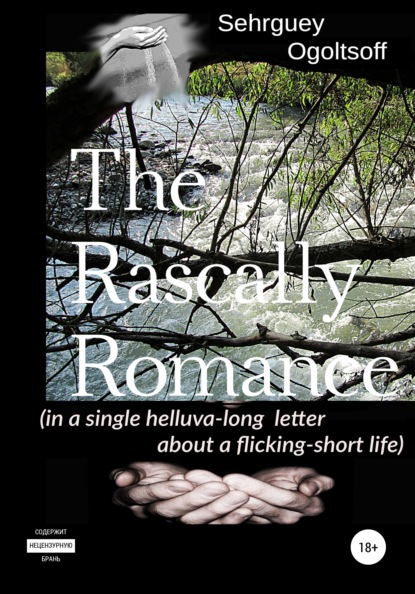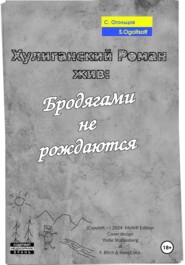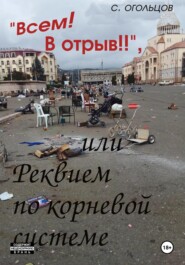По всем вопросам обращайтесь на: info@litportal.ru
(©) 2003-2025.
✖
The Rascally Romance (in a single helluva-long letter about a flicking-short life)
Настройки чтения
Размер шрифта
Высота строк
Поля
The solitary walk in the big company, under the dictation about Merry Drummer, laid me up in bed with the temperature. It was strangely quiet all around with everyone gone to work and to school.
Because the books from the Detachment’s Library finished and there was no one to go and exchange them for me, I had to pick one from our home library that filled a shelf in the closet of the cupboard in the parents’ room. After a certain hesitation, I chose the one that for a long time had been attracting me by its title, but whose thickness shooed off, the four-volume War and Peace by Tolstoy.
The opening chapter confirmed my fears by its text in French running page after page, however, it eased off when I noticed that it was translated in the footnotes… Because of that novel, I did not notice my illness but hastily swallowed the medicines and hurried back to Pierre, Andrey, Petya, Natasha… at times forgetting to take thermometer from out of my armpit….
I read all the volumes and the epilogue, yet the concluding part—the discourse on predestination, I couldn’t overcome. Its endless sentences turned into a bluff of glass where, climbing up for a tad bit, I invariably slipped back to its foot. The insurmountable glass-wall stretched in both directions, and there was no way to figure out where I got to that point from. The last volume was closed without reading it up to the very end.
(…a couple of years ago I re-read the novel, from cover to cover, and said that if a person was capable of writing like Tolstoy in that concluding part of War and Peace then why bothering themselves with all that prelude fiction, including the epilogue?
Probably, I kinda showed off, in part, but only just in part…)
And while I was lying on my folding bed amid the battlefield of Austerlitz, life was not standing still. My sister-’n’-brother kept bringing news that the garbage enclosure had been pulled down and replaced by a shed. And the field between the shed and the Bugorok-Knoll turned into a skating rink! As big as all that field leveled by the solitary bulldozer back in autumn. Yes, there arrived a fire-engine, they dropped the hoses on the ground and leaked tons of water. It’s a real skating-rink now! And they were lending out skates at the shed! You could come and borrow skates or, optionally, bring your own and go skating!
I did not want to lag behind life, and promptly recovered. Still, I was late. They were no longer lending skates at the shed, and you had to bring some with you. The benches in the shed were still in place, so you could sit down and put on the skates you brought, leaving your felt boots under the bench or in a locker if there remained any vacant one, and go skating.
As it turned out, there were 2 sheds, cheek by jowl, and 2 doors upon a high wooden porch. The door on the right led to the locker-room, and the other one to the warm-up room equipped with the electric skate grinder and a stove made of a wide iron barrel. The hot fire crackled in the stove to warm your frozen hands or dry up your mittens. You had to look out though to take your mittens off the stove in time or they'd stink with singed wool they're knitted of. Yehk!
No words could ever describe my desire to become a skater. How deliciously crunched the ice under the skates! And you didn’t run, but flew like a winged swift shooting ahead of the crispy crunch of your steely blades!.
I started learning with double-bladed skates, which had strings to tie them to boots, and I was laughed at for using such kindergarten playthings. “Snegoorki” came in their place, the round-nosed skates of one blade each, but also with the strings for tying. And nothing came out with them either, no flight, no joy, just some odd iron pieces on my felt boots. Finally, Mom brought from someplace real “half-Canadians” riveted to the shoes of their own.
With those real skates hung over my shoulder, I hurried to the locker room at the skating rink. I put them on and went out on ice. All I could get there was an awkward hobbling back and forth. The skates did not want to stand evenly, they kept falling in or out, giving painful twists to my feet. I had to return back to the locker-room walking the snowdrifts around the skating rink, where dense snow kept the skate blades upright which prevented them from breaking my tortured ankles out.
The final attempt occurred in the evening after Dad came home from work and had his supper. At my request, he tightly laced the “half-Canadians” making them one with my legs. I went out the door and clattered down the flights leaning onto the handrail. From where the railing ended I walked to the entrance door with my hand to the wall. The outer wall of the house supported me on my way around the building. Farther on, there were auxiliary snowdrifts, but the road I had to cross fluttering my hands like a tightrope walker.
At last, I got to the skating rink to see that the uptight lacing brought no improvement, the skates again were breaking my feet in and out even though cinched by Dad… I stood there for some time, in pain and envy to the crowd of wing-footed ones happily rushing around me, before to start the endless hurtful way back.
(…and never more in my life tried I to skate.
“ He cannot fly who’s born to crawl.”…)
~ ~ ~
On a clear day-off our landing neighbor, Stepan Zimin, suggested I join a ski walk he and his son Yura were taking in the forest, for which occasion Dad went down to our basement section and brought the skies. The leather loop in the middle of each ski allowed slipping your felt boot's nose into it. 2 pieces of white rubber band, like that in underpants, each tied to another leather loop, served elastic nooses about the felt boot heels not to let the skis slide off.
Both Yura and I had a pair of ski poles each but Stepan went out with just skies on his feet but—whew! —he moved so nimbly without any poles! He glided down the Gorka and we followed, falling and getting up to glide farther on.
Then we turned into the forest to the left from the Recruit Depot Barracks and walked thru the almost impenetrable thicket of the half-dried Pine trees. We came across a couple of square holes in the deep snow there. Stepan explained they were dugouts during the war for the soldiers to live in. It was hard to believe because the war ended before my birth, which meant ages and ages ago, and in the course of so long a period all the trenches, and dugouts, and bomb-holes should have completely got leveled up and effaced from the earth….
Never again Stepan went out for a ski walk, but I liked skiing and started to glide down the hillocks and knolls nearest to the road surrounding the two blocks. And, of course, I volunteered to participate in the ski competition held at school, for which occasion, on the eve of the cross-country race, I asked Dad to change the worn-out rubber bands on the leather loops in my skies. He casually dismissed the problem saying they’re sturdy enough to hold on, and there’s nothing to bother about.
The start was given from the glade where in autumn they pulled down the barrack on the Sunday of Collective Free Work. From the start point the ski track went into the forest and after zigzagging there for a couple of kilometers returned back, start and finish at the same point: 2 in 1.
Our group of fourth-and-fifth-graders was flagged off all at once, with a senior schoolboy running ahead of us so that we wouldn’t go astray among other ski tracks there. I was getting overtaken, and I was overtaking others yelling at them eagerly, “The track! The track!”, so that they would give way along the two narrow unbroken ski prints in the snow. And when they shouted “The track!” behind my back, I reluctantly stepped aside into the untrodden sticky snow, because that’s the rule.
We ran, and we glided, and we ran again. Down one especially steep slope, we piled in over each other. I got from the pile one of the first and frantically rushed ahead, but some two hundred meters before the finish that meanie rubber band burst up and the ski slid off from my felt boot. Keeping back scorching tears, I reached the finish in only left ski, driving the right one with kicks along its part in the ski track. The refs liked it, they laughed, but I, on coming home, burst into tears, “I knew it! I warned! I asked!”
Mom went on at Dad, who wanted to talk back but couldn’t find what to say. The next day he brought from his work and fixed to the ski leather loops some elastic band of ivory color, as thick as a pinky finger.
(…that fixture never failed, and even twenty-two years later the band served as it should.
Skies, on the whole, are doggedly long-liver creatures…)
With so reliable fasteners, on Sundays I was taking to the woods all day long. The endless well-trodden ski track stretched from beyond anything to out of everything. At times, the ski track branched off and two tracks ran along, side by side.
I liked the snappy claps of skies against the ski track behind my back. On the way, I sometimes met single soldier-skiers enjoying their Sundays with their greatcoats left at the Regiment, flapping the loosened uniform shirts not girded by the army belt.
The unbending ski track led to my favorite gliding grounds—a deep combe where the speed gained by the onrush down one slope took you up about one-third of the opposite one. I was delighted and proud that I could plunge like those solitary soldiers, although at times I had mind-blowing falls, especially at the jump ramp they built of snow for their jumps…
One day I noticed a secluded ski track forking from the mainline which—as I gradually figured it out—was running along the former controlling clearing of the Mailbox-Zona-Object-Detachment before its expansion.
The fugitive ski track led me to an astounding ski-plunge slope in the depth of the thicket. Though the slope was grown with perennial Fir-giants dictating an abrupt turn at its foot, yet, if you did not fall at that point, the plunge took you amazingly far with the speed squeezing tears from your eyes and making repeat the drive over and over again…
Following Sunday I almost did not fall at that tricky turn and rode the slope till very late, when the deep violet shadows began to trickle down from the dense branches of Fir-trees laden with the thick snow layer.
Then all of a sudden, there came a strange feeling that I was not alone, that someone else was watching me from behind the backs of the mighty Firs. At first, it was scary but giving heed to the benevolent silence of the trees around, I realized that it was him, the forest, friendly spying on me because we were one—me and the forest… The twilight deepened and I remembered that Block was more than two kilometers away.
(…of course, I got home in the dark and bore the brunt of Mom’s displeasure, yet until now when recollecting that winter purplish twilight and the good-willed quietude of the forest, I know that I lived not just so…
The same feel of dissolving and turning into a part of everything else around when you cannot say where your “I” ends and turns this or that “not-me”, I've lived thru once again and much later, in Karabakh already. Only that time it was I who watched, and it happened in summer instead of winter.
Even though telling this story disrupts the linear flow of narrative, in full violation of the classical time-place-action-unity canon yet, after all, it is my letter and it’s my life, and why not to take turns to my liking?
So…)
~ ~ ~
In Stepanakert, I am not to be seen a day or two before my birthday and about as long after it because for that period I enjoy the freedom of hiking.
(…dig it? Summertime is the most advantageous season to be born into not only because fish are jumping and your daddy is rich…)
My local relatives have already given up to be surprised or get angry. They concluded that it’s an old, odd but firmly established, Ukrainian tradition—to go away for your birthday and just walk following a random look of your eyes. And so it was in August (I don’t remember the exact year) end nineties’. Yes, no later, because of this here tent was bought in the last year of the last millennium.
That August I went north thru the woods over toombs where there were no villages but the views of enthralling beauty. Exactly as in the age-old warning by Mom, “You’ll be there alone.”
After a day-long climbing up to ascend a toomb-ridge where the woods got replaced by the alpine meadows, I came across some soot-black pieces of slate and a bunch of charred poles. Apparently, before the war shepherds were coming there with their flocks, and they brought the construction materials to build a hovel. And who burned it? Well, you never know… why always to find fault with humans? could be a random lightning after all… Anyway, nothing of my business.
So, I passed and went on, higher, and in a saddle bridging two toombs I discovered an ancient toomb. How did I guess at its antiquity? An easy question… It was excavated, unearthed by scavengers greedy for a buried treasure who left a hole in the ground and 4 to 5 roughly-hewn stone slabs, half-ton each. People weren’t buried that way under socialism, nor in the capitalist epoch. The nearby ridges were not rocky so the slabs had to be transported from afar. But what for?
Well, one look around would remove the question— What a sweep of incredible beauty! The sky without any limit, the placid wavy chines of toomb-chains all around, the distant ones covered with dark woods, and those nearby with Alpine meadows… Now, bringing the slabs from as far as I could not suppose where would call for a plum sum of money, or real power, or both. Which made more than enough of clues for the unbeatable guess: it was one of the Karabakh melique-princes who one day rode out hunting, reached that place and fell in love with it, and didn’t want to get parted from it even after his demise. The only nagging flaw in his calculations— the greed of ashes desecraters was not taken into account.
See? No historical enigma can escape its ultimate solution when we apply to it our tall tales in the absence of any opponent…
I passed over to the next toomb and, on its summit, got under the rain. Not a big deal though, because for such occasions, I’ve got a thoroughly worked-out and pretty practical technique.
So, as usual, I took off all of my clothes, packed them into a cellophane bag and started dancing in the altogether under the downpour. Those dances, actually, were never meant as some pagan ritual, they're intended to keep me warm, in the mountains up there without the sun and under the rain it’s really chilly, let me assure you. But still some tinge of witching paganism is also there or else where those primeval yells come from to accompany the free nude dances? Anyway, solitude does have certain advantages— you’re not likely to be arrested for violation of public order and morals.
And, after the rain is over, I simply rub-dry myself with the sweater and put on the dry clothes from the bag, ain’t I a smart guy?











